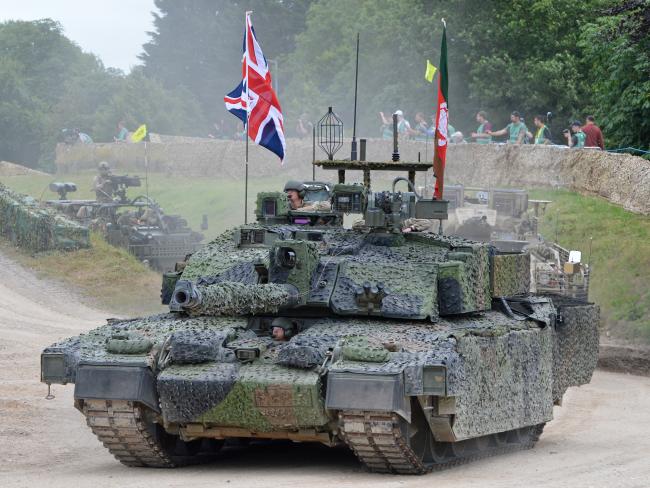9 February 2023

Challenger 2 tank; with which the UK now proposes to arm Ukraine. Photo Alan Wilson via Flickr (CC BY-SA 2.0)
This week the Ukrainian President Volodymyr Zelensky stepped up efforts to further involve Britain and other NATO countries in his country’s war against Russia. This makes escalation of the conflict more likely, not less.
After speaking to the UK Parliament, he went to the EU in Brussels with the message that he’s fighting on their behalf. With only a few exceptions, politicians in the EU and Britain have bought that line. Some try to appear reluctant or cautious, but most are happy acting as cheerleaders. And it’s the same in the US.
Praise
Zelensky spoke to MPs and peers in Westminster Hall on 8 February to their unqualified praise, echoed by the media. The prime minister Rishi Sunak said “nothing is off the table” – and agreed to send longer range missiles and to begin training Ukrainian pilots on NATO fighters. That was not quick enough for Zelensky who claimed his pilots could be ready in six months rather than the three years such training normally takes.
The next day, the British defence secretary Ben Wallace was more cautious about supplying aircraft, talking about long range missiles and drones instead. He was no doubt mindful that the RAF has trouble training its own pilots and has few suitable aircraft to spare.
Armed attack
The aim for Zelensky is to join the EU, for which he received applause in Brussels. And next comes membership of NATO. That may not play so well – Article 5 of treaty says armed attack against one member state is considered as an attack on all.
NATO powers have flooded Ukraine with arms, equipment, and money, and although corrupt politicians and businessmen have sold or stolen huge amounts, enough have reached the unfortunate soldiers at the front to enable the increasingly pointless stalemate to grind on.
‘Ukraine wants the ability to strike into Russia.’
NATO members have promised modern tanks to break that stalemate on the ground. And now Ukraine wants long range, offensive capacity – including ground attack fighter aircraft. That can only lead to escalation of the conflict. Simply, Ukraine wants the ability to strike into Russian territory.
Russia’s attack on Ukraine has increased the danger of a NATO war against Russia, not removed it. In March last year, President Biden promised that he would not send “offensive equipment” and “planes and tanks” to Ukraine, because this would trigger war. Yet now he is about to send 31 Abrams tanks, the German government is to send 14 of its Leopard 2 tanks, and Britain will send 14 of its Challenger II tanks.
This January US Defense Secretary Lloyd Austin and Chairman of the Joint Chiefs of Staff General Mark Milley stated that the USA was committed to now going “on the offensive to liberate Russian-occupied Ukraine”, meaning all of Donbas, and Crimea.
The world is clearly in even more danger than it was at this time last year. During a recent debate at the Parliamentary Assembly of the Council of Europe, the German Foreign Minister Annalena Baerbock stated, “we are fighting a war against Russia.”
Consequences
Calls for peace are coming from some surprising quarters. The influential and normally bellicose RAND Corporation policy think tank published a paper last month about the possibility of a lengthy war in Ukraine. It emphasised that “the consequences of a long war — ranging from persistent elevated escalation risks to economic damage — far outweigh the possible benefits.”
The paper points out that the risk of escalation, ultimately involving nuclear weapons, increases the longer the war goes on. It argues that the US interest is in reducing that risk by avoiding actions that would lead to a long war. Instead the US should recognise that the war is likely to end through negotiations and should work to overcome impediments to starting talks.
Obstructed
That’s going to mean a change of tack from the US and its allies. The former Israeli Prime Minister Naftali Bennett said in a recent interview on his YouTube channel that they obstructed his efforts to mediate between Russia and Ukraine and bring an end to the war soon after it began.
The RAND paper concludes, “…avoiding a long war is also a higher priority for the United States than facilitating significantly more Ukrainian territorial control.” That applies equally to other NATO members, Britain included, whose leaders seem oblivious to the war risks and in thrall to Ukrainian demands.
Demand
But politicians and “leaders” are not the people of Britain or anywhere else. Sympathy for Ukraine is high, but that’s not the same as wanting a widening war. An armistice or a settlement will reduce the dangers of disastrous escalation, reduce the numbers of people being killed, and reduce the social and economic damage being suffered. That should be our demand.
Even the best settlement in Ukraine will not end the danger of war, even of nuclear war. These dangers will persist for as long as we allow imperialisms to exist, and for us here in Britain, that must mean that we get ourselves out of the NATO military alliance which emboldens aggressions by the ruling classes of the USA and Britain.
